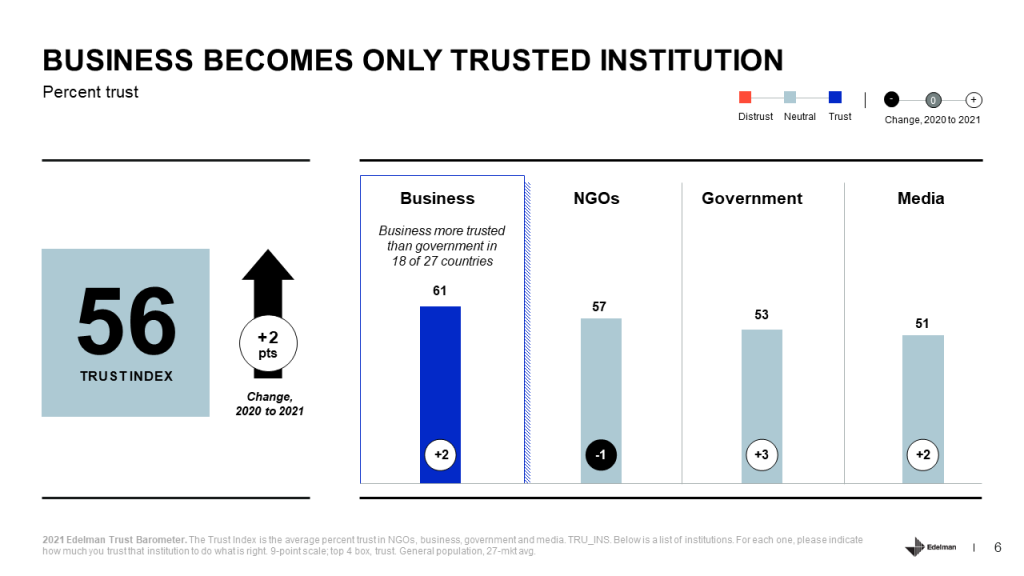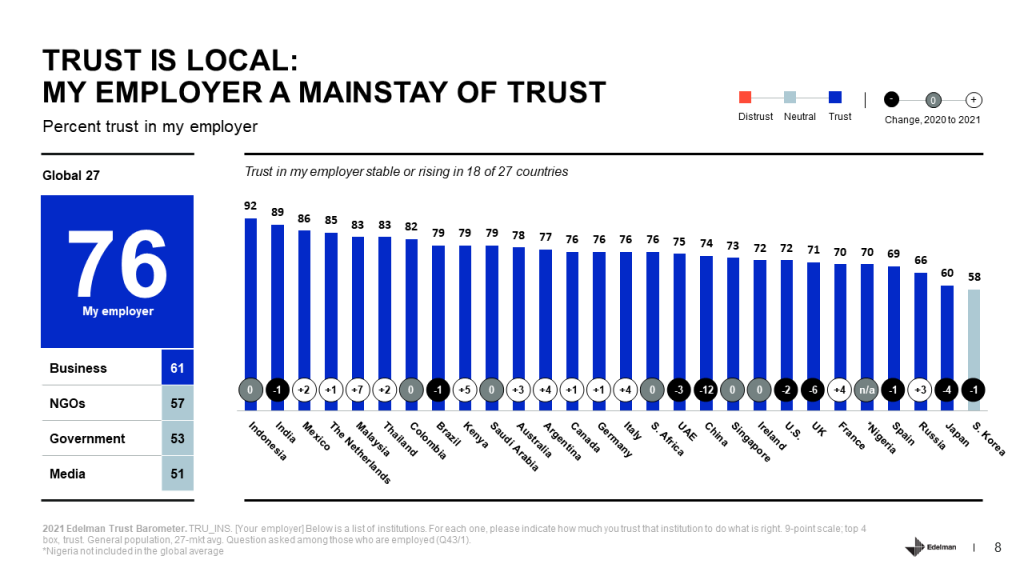On June 17, 2021 The British Chamber of Commerce for Italy (BCCI) in collaboration with Edelman and Marsh hosted a thought-provoking online event to discuss insights from the latest Edelman Trust Barometer report: “The World After Covid”. We would like to thank again our exceptional speakers Fiorella Passoni (CEO Edelman Italy), Hugh Taggart (Co-CEO Edelman UK), Andrea Bono (CEO Marsh Italy and Eastern Mediterranean Region) and Tom Noad (President of The British Chamber of Commerce for Italy) for their valuable contribution to the discussion.
To find out the key topics discussed at the event please read the following article by
Pragmatism took center stage during the webinar Tom Noad of the British Chamber of Commerce organized to discuss some of the changes that the pandemic has brought about over the last 16 months or so, and how they have affected business.
The starting point of the discussion were the Edelman Trust Barometer results and, specifically, the role of Business in leading change and making a positive impact, as well as Tom Noad’s assumption that the BCCI promotes Italian business in the UK for a love of excellence and a love for making the world a better place.
As Tom Noad effectively summarized, this is the time for change, and change is not going to be led by politicians. It is up to Business to take the lead and make the change. An assumption that ties in very nicely with the outcomes of our Trust Barometer this year, and that fits the Edelman vision according to which our purpose goes beyond just doing business, and that we all must strive and do our part to help the world become a better place for everyone.
Together with what we call “Capitalism Failure”, the 21st edition of the Edelman Trust Barometer highlighted some other key issues that seem to scare participants to the survey the most: the future of work, the faster and faster pace at which technology is changing our lives, and an ever-growing worry about being able to discern what is real and what isn’t in the information we fed on every day.
As opposed to the majority of Countries investigated in the Trust Barometer, where all institutions showed a dramatic decrease in trust, with Governments at their lowest ever, Italy tells a different story and Government showed up stronger than ever: up 10 points in 2021.
At global level, Business – which is the most trusted institution in Italy with an overall score of 59% – is now requested to lead in order to make the change happen and promote a new way of doing business while keeping a healthy balance between professional and personal life. Business is also the only institution seen as both ethical and competent worldwide.

Leadership is a totally different matter. In a year of profound crisis, leadership fails and not a single societal leader, governmental officials, CEOs, journalists, or even religious leaders are trusted to do what’s right. Proximity is key for Trust, that goes mainly to those people who are closer to us: family members, our local community, my CEO.

Even Scientists, always amongst the most trusted leaders, are losing ground, probably due to the over-exposition of the past months.
All things considered, there’s a new mandate for Business which is now asked to act beyond the business itself. 74% of respondents are requesting CEOs and senior leaders to stand up and speak up about societal issues, pandemic impact first, but also what the increasing job automation means and how local and societal issues should be solved.
Another major outcome is the discovery of how many people do not practice a good information hygiene, made up by four main factors: news engagement, the ability to avoid the information echo chambers, the ability to verify the information and the ability not to amplify unvetted information.
Italians seem to have a better information hygiene than the rest of the Countries surveyed, including UK.
Finally, in terms of credibility, while Technology – though still strong – has been losing ground through the years, Financial Services improve their performance (15 years ago, they were at 30% and now the sector is at 42%), while the other industries are performing evenly with respect to the past.
As explained by my colleague Hugh Taggart, Co-CEO Edelman UK, UK sees My Employer as the most trusted and the most resilient institution in the UK. This is because we’ve seen that people are far more likely to trust things that are familiar and local to them, so in the course of last year My Employer has proven to be a real beacon of trust in the UK and this is in part due to the rise in trust of a “person like myself”.
Moving on to the pandemic mindset, we ask respondents in the survey to indicate one of two options to describe how they’re currently feeling. One option was to say that they feel the pandemic is largely behind them and that they’re taking advantage of every opportunity to get back to their pre-pandemic life. Option two was to say they are still in a pandemic mindset; it is revealing that in 12 of the 14 countries that we surveyed, including the UK, the majority of respondents stated they are still in this pandemic mindset, nearly two in three globally.
Even more concerning, especially for Business, is that vaccination doesn’t necessarily confer immediate peace of mind about resuming normal activities. The pandemic has also exacerbated previously existing concerns and created new uncertainty about the future.
What is particularly interesting about the UK data is that a company technical expert has emerged as the most trusted spokesperson, passing academic experts who previously held the top spot.
People trust the information they receive from expert advisors and their employer CEOs. The implications are many but it’s clear that sometimes the best way to get your message across is to have other people speaking about the company and businesses should really be encouraged to look at a diverse mix of people that can speak on the company’s behalf and particularly people like you and I, people we have a tangible relationship with.
This approach is strengthened by the fact that communications from employers are more readily believed than communications from other sources. This trend was first seen in January 2020 and has stayed consistent ever since. It presents a huge opportunity for Business; once again, employers are in a key position to solve problems by providing trustworthy information and help overcome the infodemic.
Business has really proven itself invaluable in the last 14 months. With those accomplishments – with helping their employees looking after society and local communities – have come much greater expectations. Business does not necessarily have to solve all society’s problems, but certainly it has to contribute in solving them, something that can only really be possible if Business partners and engages with other institutions in order to get results.
Business cannot go at it alone; it must partner with other institutions to address these societal challenges and it must also show that both consumers and employees have a seat at the table to contribute to business-making decisions and business strategy, as well as community related activities.
The pandemic – as horrible as it has been – is going to create the opportunity for valuable innovations. There is a potential for positive change coming out of the pandemic, ranging from improvements in healthcare preparedness for future pandemics, innovation, development of technologies, even more attention to solving the issue of climate change, and more.
So, how do we move forward in a post-pandemic future? The lack of trust in media, the lack of good information hygiene, the increased focus on solving societal problems, mean the Business has a huge opportunity and also a big responsibility to forge partnerships to really drive the recovery.
As Hugh highlighted, Business must embrace its expanded mandate to lead on issues and it must do it while being aware that it cannot solve all of the challenges, especially on its own: partnership is going to be the key to success.
None of the four institutions – Business, NGOs, Media, Government – can do it alone; by working together, the four institutions can make a big difference, innovate, grow in an ever more sustainable way, create new job opportunities, and – above all – make the world a better place for the generations to come.
